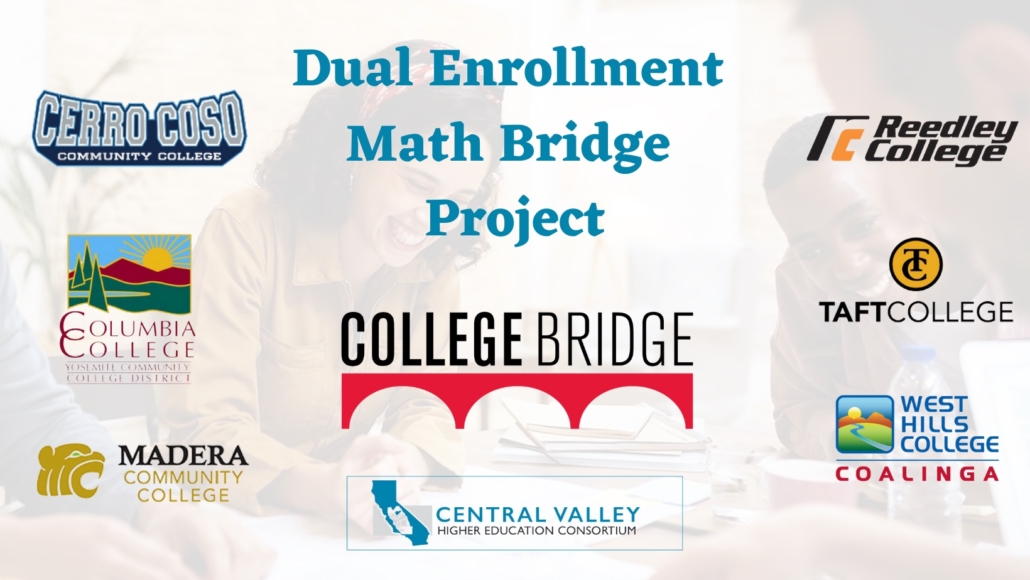CVHEC Partners With College Bridge in Grant Supporting DE Courses from Six Rural Community Colleges at 21 Service Area High Schools
(UPDATE May 26, 2023) – See Math Bridge Kickoff May 18 coverage.
BY TOM URIBES
CVHEC Communications Coordinator
(JANUARY 24, 2023) — Six rural Central Valley Higher Education Consortium member institutions will partner with 21 high schools to promote equity in mathematics via dual enrollment courses for Black or Latino students thanks to a $4 million federal grant awarded to CVHEC partner College Bridge.
The Dual Enrollment Math Bridge Project, with a total budget of $6.7 million, was awarded the five-year US Department of Education grant in late December for the six colleges to provide college-level math classes that will improve and support college readiness for underprepared students in the colleges’ respective service areas beginning next fall. (This federal grant supports 60 percent of the total project budget with the remaining funding coming from non-governmental sources).
The participating CVHEC colleges are: Cerro Coso, Columbia, Madera, Reedley, Taft and West Hills College Coalinga. The names of the participating high schools will be released in February.
“For this grant, Dual Enrollment Math Bridge will include nearly 8,000 low-income, Black or Latino 11th or 12th grade students who lack access to rigorous math courses,” said Dr. Lynn Cevallos, founder and president of College Bridge, a California non-profit based in Los Angeles County dedicated to forging a path towards both college access and success for underrepresented students.
“This DE Math Bridge project is an innovating high school intervention that will close equity and attainment gaps in college math and college completion at the 21 Central Valley rural high schools within the six colleges’ service areas,” she said.
Cevallos created College Bridge in 2011 with the mission “to transform the K-16 educational system by identifying and eliminating barriers that prevent underrepresented students from progressing to and through college.”
CVHEC is assisting the Dual Enrollment Math Bridge project by using its role as a convener to bring the higher education and K-16 representatives together with College Bridge, Cevallos said.
CVHEC is made up of 30 institutions of higher education in the Central Valley’s nine-county region from San Joaquin to Kern Counties including 15 community colleges and four multi-campus community college districts. The presidents and chancellors of each institution serve on the CVHEC Board of Directors. CVHEC also created the Central Valley Dual Enrollment for Equity and Prosperity (CVDEEP) Task Force made up of valley educators and policy makers that the consortium convenes to address dual enrollment issues as well as issued a white paper in June 2020.
Dr. Benjamín Durán, CVHEC executive director, said the DE Math Bridge project “will prepare and guide students as they transition to college or university equipped with math credits and confidence.
“The DE Math Bridge creates a model for meaningful dual enrollment pathways and expansion that can be replicated in other regions of California serving underprepared students,” Duran said. “We commend College Bridge for its leadership in serving Central California students as well as the leadership of our member community colleges in collaborating with their K-16 districts and College Bridge.”
Cevallos said the Dual Enrollment Math Bridge Project goals include three student-level goals with implementation of classes planned for the fall 2023 semester:
- closing equity and achievement gaps in mathematics, improving rates of underrepresented students pursuing STEM majors and completion of college transition plans;
- professional development goals to creating sustainable continuous improvement models for intersegmental math, counseling and administration teams;
- and two goals focused on sustainability and scaling.
The project is based on an evolving series of longitudinal research/practice projects that College Bridge has successfully implemented since 2013 — the Math Pipeline Readiness Project (M-PReP), Cevallos said.
“Nearly 2,000 underprepared students participated in previous versions of M-PReP with 84 percent passing a college-level math course through the program.”
One M-PReP success story occurred in 2018 at Dinuba High School, a Central California rural high school that served 1,988 students at the time (82 percent socioeconomically disadvantaged and 93 percent Latino).
For more information about the DE Math Bridge Project, contact Owynn Lancaster, vice president of Academic Strategy at College Bridge: Owynn.lancaster@college-bridge.org.
For CVHEC media inquiries: Tom Uribes, CVHEC Communications/Media coordinator (tom@uribes.com or text 559.348.3278).
See the College Bridge press release.
UPDATES





Leave a Reply
Want to join the discussion?Feel free to contribute!